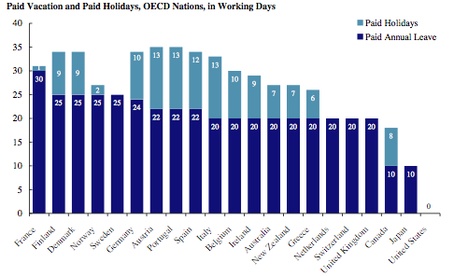http://20somethingfinance.com/american-hours-worked-productivity-vacation/
The U.S. is the Most Overworked Developed Nation in the World – When do we Draw the Line?
We, as Americans, work too many hours. If you don’t believe so, check out the following data points that compare us to our peers around the world.
American Work-Life Balance
- According to the Center for American Progress on the topic of work and family life balance, “in 1960, only 20 percent of mothers worked. Today, 70 percent of American children live in households where all adults are employed.” I don’t care who stays home and who works in terms of gender (work opportunity equality for all – it’s a family choice). Either way, when all adults are working (single or with a partner), that’s a huge hit to the American family and free-time in the American household.
- The U.S. is the ONLY country in the Americas without a national paid parental leave benefit. The average is over 12 weeks of paid leave anywhere other than Europe and over 20 weeks in Europe.
- Zero industrialized nations are without a mandatory option for new parents to take parental leave. That is, except for the United States.

American Average Work Hours:
- At least 134 countries have laws setting the maximum length of the work week; the U.S. does not.
-
In the U.S., 85.8 percent of males and 66.5 percent of females work more than 40 hours per week.
- According to the ILO, “Americans work 137 more hours per year than Japanese workers, 260 more hours per year than British workers, and 499 more hours per year than French workers.”
- Using data by the U.S. BLS, the average productivity per American worker has increased 400% since 1950. One way to look at that is that it should only take one-quarter the work hours, or 11 hours per week, to afford the same standard of living as a worker in 1950 (or our standard of living should be 4 times higher). Is that the case? Obviously not. Someone is profiting, it’s just not the average American worker.
American Paid Vacation Time & Sick Time:
- There is not a federal law requiring paid sick days in the United States.
- The U.S. remains the only industrialized country in the world that has no legally mandated annual leave.
- In every country included except Canada and Japan (and the U.S., which averages 13 days/per year), workers get at least 20 paid vacation days. In France and Finland, they get 30 – an entire month off, paid, every year.
- Then there’s this depressing graph on average paid vacation time in industrialized countries:

The Impact of Too Much Work
I’m not telling you to work less hours. If
you genuinely love what you do and are doing it for the right reasons,
you are more than entitled to spend all of your waking hours plugging
away.
But for many of us, more work leads to more
stress and a lower quality of life. Without time to unwind, take care
of your home, spend time with loved ones, enjoy our hobbies, connect
with friends, and generally live a more balanced life. Stress is the #1
cause of health problems – mentally and physically. And there are few
things that stress us out on a consistent basis like work does,
especially when it takes away from all of the other things that life has
to offer.
Americans are the Outliers
And if all of this data tells anything, it’s that we are the outliers, not the norm. Why are we the outliers?
- Our companies fairly ruthlessly let people go. We want to keep our jobs and not be a ‘low performer’ compared to others.
- The decline of the union has led to less paid time off and other leave benefits.
- Cultural value of money over everything else. We love money, we want more of it, and we think money can buy happiness. And the more we work, the more we get paid.
- It’s been drilled in our heads that we are lazy compared to emerging market counterpart workers in India, Mexico, China, and other parts of Asia. Who isn’t? And what is our mental image of the work environments in those locales? To validate those fears, our jobs are being outsourced to the cheap labor in those countries. In reality, the U.S. is still the world leader in productivity per person.
- Our legislative branch of the government (on both sides of the aisle) has been bought and as a result has shied away from passing laws that protect workers that every other industrialized nation has passed.
- We generally don’t fight for our working rights. We take what is given to us.
What we All Need to Remember
What we all need to remind ourselves is that it doesn’t have to be this way.- It’s OK to ask to move to fewer hours at work.
- It’s OK to take a week-long vacation if we need to.
- It’s OK to ask to work from home.
- It’s OK to take a month of unpaid leave while you raise a child.
- It’s OK… you get the idea.
Overworked Discussion:
- Do you think we work too hard?
- Do you like the cultural norm around your workplace on working hour expectations?
- How have you been able to limit unhealthy overworking habits?
